The SSD Anthology: Understanding SSDs and New Drives from OCZ
by Anand Lal Shimpi on March 18, 2009 12:00 AM EST- Posted in
- Storage
PCMark Vantage
Next up is PCMark Vantage, another system-wide performance suite. For those of you who aren’t familiar with PCMark Vantage, it ends up being the most real-world-like hard drive test I can come up with. It runs things like application launches, file searches, web browsing, contacts searching, video playback, photo editing and other completely mundane but real-world tasks. I’ve described the benchmark in great detail before but if you’d like to read up on what it does in particular, take a look at Futuremark’s whitepaper on the benchmark; it’s not perfect, but it’s good enough to be a member of a comprehensive storage benchmark suite. Any performance impacts here would most likely be reflected in the real world.
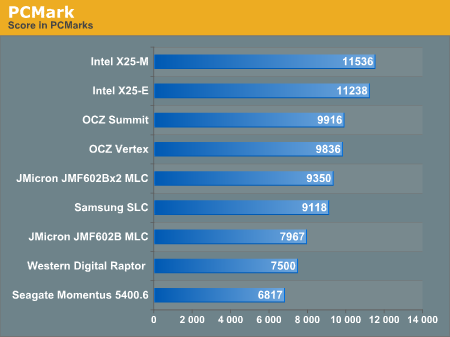
If you've paid attention to the synthetic tests from the previous pages, the results here should make sense. The Intel drives take the top two spots followed by the two OCZ drives, then the JMicron and conventional HDDs take up the rear.
While PCMark does do a great job of measuring disk performance, it doesn't seem to stress random write performance as much, allowing the JMicron drives to relax a bit.
Now let's look at the individual test suites:
The memories suite includes a test involving importing pictures into Windows Photo Gallery and editing them, a fairly benign task that easily falls into the category of being very influenced by disk performance.
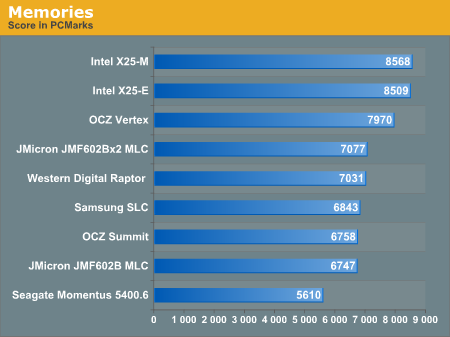
The TV and Movies tests focus on on video transcoding which is mostly CPU bound, but one of the tests involves Windows Media Center which tends to be disk bound.
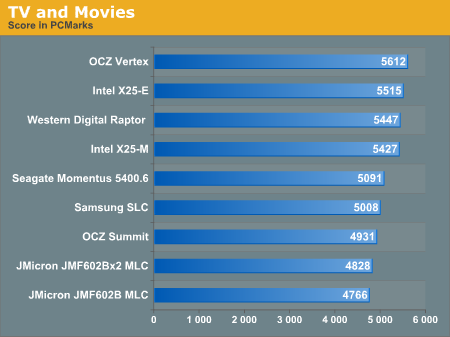
SSDs won't always dominate and in many cases they won't offer tangible improvements over a fast hard drive.
The gaming tests are very well suited to SSDs since they spend a good portion of their time focusing on reading textures and loading level data. All of the SSDs dominate here, but as you'll see later on in my gaming tests the benefits of an SSD really vary depending on the game. Take these results as a best case scenario of what can happen, not the norm.
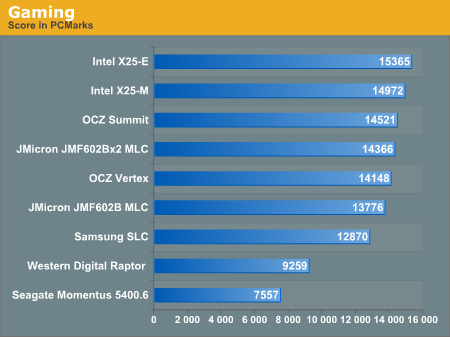
In the Music suite the main test is a multitasking scenario: the test simulates surfing the web in IE7, transcoding an audio file and adding music to Windows Media Player (the most disk intensive portion of the test).
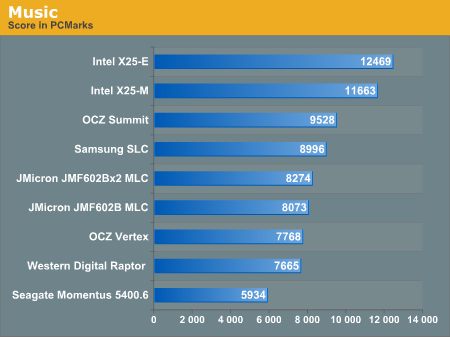
The Communications suite is made up of two tests, both involving light multitasking. The first test simulates data encryption/decryption while running message rules in Windows Mail. The second test simulates web surfing (including opening/closing tabs) in IE7, data decryption and running Windows Defender.

I love PCMark's Productivity test; in this test there are four tasks going on at once, searching through Windows contacts, searching through Windows Mail, browsing multiple webpages in IE7 and loading applications. This is as real world of a scenario as you get and it happens to be representative of one of the most frustrating HDD usage models - trying to do multiple things at once. There's nothing more annoying than trying to launch a simple application while you're doing other things in the background and have the load take seemingly forever.
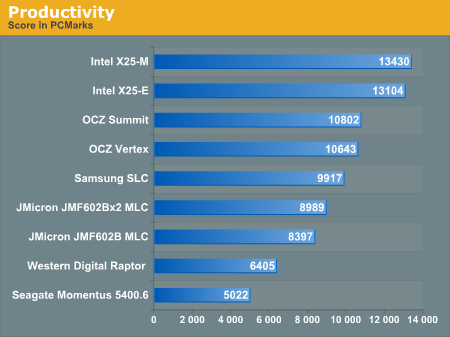
The results here are the best characterization of my personal experience with the drives. The Intel drives are the fastest, a good 25% faster than the Summit or Vertex. Next up are the OCZ drives, with the Vertex dangerously close to the Summit. The older Samsung SLC is next in the standings, followed by the JMicron drives. There's a healthy combination of reads and writes going on here which benefits all of the SSDs, including the less desirable ones.
The final PCMark Vantage suite is HDD specific and this is where you'll see the biggest differences between the drives:
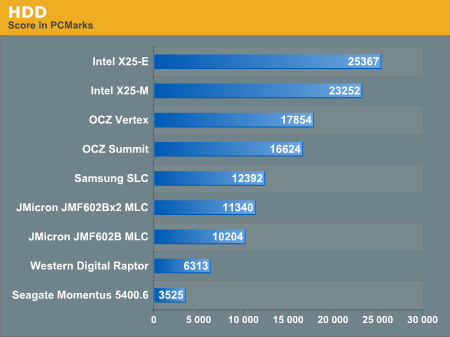
Again we're seeing the sort of breakdown we'd expect. The Intel drives come out ahead, while the Vertex is the best bang for your buck.










250 Comments
View All Comments
Franco1 - Wednesday, March 18, 2009 - link
I've been waiting a long time for this review. It was certainly worth the wait! I would love to see some benchmarks with 2+ drives in RAID configurations via onboard and add-on controller cards. Maybe another follow up?Howard - Wednesday, March 18, 2009 - link
Looks like the Vertex is the drive to get, especially once the user base expands a bit.MagicalMule - Wednesday, March 18, 2009 - link
Thanks for the article. Everyone is critiquing grammar and all this nonsense it seems, but I really enjoyed the article.It was very thorough and very informative.
Keep up the good work. =).
futrtrubl - Wednesday, March 18, 2009 - link
You missed out a VERY significant step that causes the greater part of the slowdown associated with your scenario. After the block is read out to cache the block has to be erased before it can be written to again and as you pointed out earlier an erase cycle, and thus the entire read/modify+erase/write cycle, takes a relatively LONG time, much longer than a simple read/modify/write.Edward
DrKlahn - Wednesday, March 18, 2009 - link
I've worked in IT for 15 years and have played with very fast arrays and know a fair amount about storage. 2 months ago I replaced my Raptor boot/gaming drive with a GSkill Titan. In day to day use I have no stuttering. The only stutter I have seen was while installing a large patch, surfing with multiple windows/tabs open and using Outlook. It wasn't even a second. I did align the partition, turned off drive indexing and defragmentation, and turned on caching. In day to day use it simply kills the Raptor. Games and applications load in a fraction of the time. Vista boot time has decreased dramatically.This isn't a case of purchase justification. If the drive was a dud I would have moved it to a secondary machine, reinstalled the Raptor, and chalked it up as a bad decision. I simply have not run into any scenario in daily use that it performs worse than the drive it replaced and I have not seen any real stuttering in daily use.
Gary Key - Wednesday, March 18, 2009 - link
I have a GSkill Titan drive also and really like it. However, my experiences while positive overall, do not compare with yours when it comes to stuttering (yes, all optimizations have been done to the drive and OS). I still have significant stuttering problems when using multiple IM programs and having multiple windows/tabs open at the same time. I literally have to wait a few seconds when texting colleagues if more than two conversations are occurring at the same time as the system pauses, hitches, and stutters in this scenario. It is especially aggravating when on Skype and trying to text, speak, and transfer files at the same time. This does not occur on the Intel drive in my testing. Apparently, it is no longer a problem on the OCZ Vertex or Summit drives. Except for my example above, I would certainly use the Titan drive over my Raptor any day of the week.druc0017 - Wednesday, March 18, 2009 - link
great article, keep up the good work, cant wait to see more updates, thxmikeblas - Wednesday, March 18, 2009 - link
Is the Velociraptor really "World's fastest hard drive", as this article states? Faster than the Hitachi SAS drives?Gary Key - Wednesday, March 18, 2009 - link
We have changed those statements to "...fastest consumer desktop hard drive...", that was the original intent of the statement, just clarified now. :)7Enigma - Wednesday, March 18, 2009 - link
I think the majority of us understood that. People just like to nit-pick.